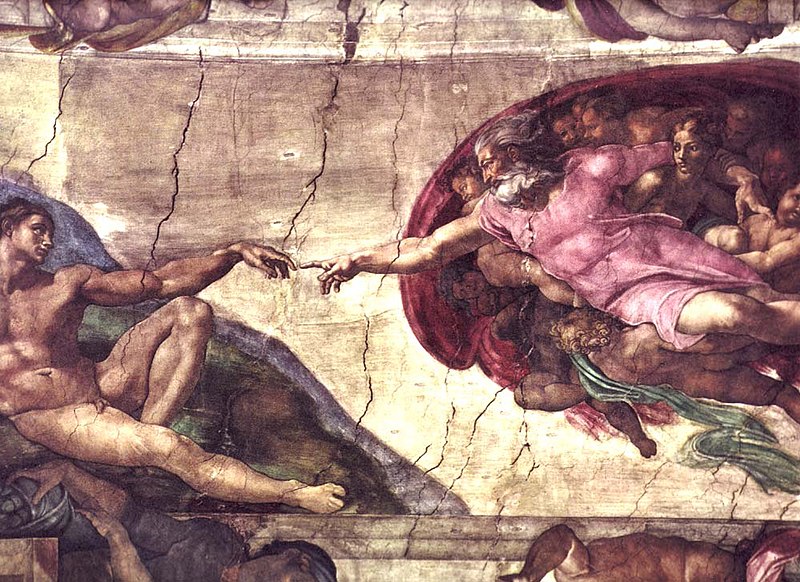In my view, all of social science, and big chunks of more experimental science (medicine, psychology, engineering) are actually subdivisions of Anthropology. Anthropology is, in its broadest meaning, "the study of humanity". Economics is the study of how humans procure things. Sociology is the study of how humans interact. Medicine is the applied science of optimal human biological functioning.
(This and unlabeled images from Wikimedia Commons)
Used in this (idiosyncratic) fashion, Anthropology is an extraordinarily complex field, comprehensible only as part of a collective endeavor, over millennia, by millions of specialists attempting to find the correct place for a single piece of the almost infinitely large jigsaw puzzle.
Different people will start in different places, in accordance with their particular interests and the tools available to them in their era. But in this place, at this moment, it seems to me that an essential piece of our collective puzzle is the process of human cognition. The way in which we perceive the world around us, and the ways in which we organize and process those perceptions will be fundamental to understanding any aspect of human behavior.
Human beings are "schematic information processors". We are extremely good at "storing" information. Memories from many years past can often be recalled with astonishing accuracy. Important phone numbers from our childhood, favorite toys, memorable family traumas can be remembered so vividly that we may reenter the emotional states we experienced at the time of the memory.
What humans are less good at is processing information. At every second, we are battered by an unceasing blast of sensory perceptions. We're cold, or we're warm. We're hungry, or we're slightly nauseous. Our shoulders twinge, our clothing is touching us, our nose is stuffed...
meanwhile, we're annoyed with a co-worker, and worried about our kid, we miss our wife, we're anxious about money...
and the radio is playing that Goddamned Adele song, AGAIN, and traffic is bad, and our coffee is sloshing around dangerously...
The vast majority of our sensory information is ignored, at least at the conscious level. We're unaware of it, because to be aware of all of it would make it impossible to function. We lack the bandwidth to process all the data to which we're constantly exposed.
Schematic information processing is a tactic humans have evolved that relies on our information storage strengths, and sidesteps our processing weaknesses. Human beings store information in cognitive "structures" known as a SCHEMA.
Schemata can be thought of as bundles of related concepts. If I say the word "terrorist" to someone, it immediately triggers a host of related concepts. The listener may "see" Osama bin Laden. The listener may remember 9/11, and experience some of the same emotions they did at the time. They will probably (at least, if they're an American) think "Arab", and "Afghanistan", and "Palestinian".
The reason for this is probably neurological, and involves complex synaptic pathways which form in the brain. The functions of this process are several.
A schema helps us interpret new information
Imagine that you step out of a building and see a half dozen people wearing late 18th century clothing, one with a drum, most carrying signs or placards. What is it you're witnessing? Most people reading this would assume that it's a Tea Party rally, because such behavior is linked to the concept "Tea Party", through news reports and pictures and opinion shows. We have a "Tea Party schema" that includes behaviors, and attitudes, and opinions and images, all tied to the concept "Tea Party".
A schema helps us recall stored information
What did Joe Wilson say in September of 2009? This is a tough question for most people... who is Joe Wilson? Who cares what he said? But, if I trigger the proper schema, by telling you that it was during a Presidential address to Congress...
many people will immediately recall that Joe Wilson shouted "You lie!" during President Obama's Congressional speech. The incident is part of a schema people hold, involving Presidential addresses to Congress, and President Obama, and conservative members of the House.
A schema helps us make predictions about the future
As I write this, A Congressional Conference Committee is deadlocked on a new transportation bill. If you know that the House is controlled by Republicans and the Senate by Democrats, you may well have predictions about the issues creating the deadlock. Even if you're unfamiliar with the details of the impasse, this is because you have formed a "schema" about Republicans and a second schema about Democrats. The schemata include what issues are of concern to each of them and what positions they typically take in public policy debates.
But it's important to remember that schematic information processing is an evolutionary kludge, a work-around of our weak information processing capacities. There are drawbacks to doing things this way.
But it's important to remember that schematic information processing is an evolutionary kludge, a work-around of our weak information processing capacities. There are drawbacks to doing things this way.
(Image from Cheezburger.com)
Schema are relatively inflexible
Information inconsistent with our preconceptions is much more difficult for us to process. Consider some typical conservative views of President Obama...
he's a "socialist". He's Kenyan. He's the most radical president we've ever had. He hates America. He "goes around apologizing for America". He's raised our taxes. He's spent more than any President in history. Except...
each of these assertions is demonstrably false. Furthermore, each of these assertions has repeatedly been publicly debunked. The President chose NOT to socialize the banks, despite being urged to do so by mainstream economists. The President has produced both long and short form birth certificates, the hospital where he was born has attested that he was born there and the birth announcement was in the local papers. The President's policies draw heavily from Republican ideas. The President speaks of America in glowing terms. The President's statements overseas are a matter of public record; they contain nothing that can be characterized as an apology. The President has CUT taxes, rather than raised them. The President has spent LESS than his Republican predecessors by any objective calculation.
And yet, conservative mischaracterizations of the President persist by people who sincerely believe them, even when confronted with contrary evidence. This is because schemata are change resistant. Information inconsistent with existing preconceptions is likely to be forgotten, or distorted in such a way as to become consistent with those preconceptions.
Furthermore, as a schema becomes more well-developed and contains more (possibly incorrect) data, it becomes less flexible and harder to change. Consider one particularly destructive form of schema: the racial stereotype.
For the hard-core racist every single piece of new data serves to strengthen their racism, regardless of the objective conclusion to be drawn from the data. The economically unsuccessful African-American is lazy and shiftless. The economically successful African-American is the beneficiary of affirmative action and probably a hustler. Blacks who are successful professional athletes are loud-mouthed and arrogant. Blacks who aren't athletic are Urkel. Even when a counter-example of a hard working, likable, smart African American is shoved down their throats, perhaps as a co-worker or neighbor...
they're cited as an exception to the general stereotype.
On the other hand, schemata that are not well-developed are easier to change. If you tell a metal-head that Lindsay Buckingham is a phenomenal guitarist, you're likely to get some pushback. The metal-heads I know are familiar with Fleetwood Mac chiefly through their hits. These songs fit conveniently into the pop/soft-rock schema held by the metal-head in question. But they haven't heard much of that stuff, and they've heard none of the more obscure stuff. Confronted with this:
they alter their schema. At least a little.
And this points us to a tactic which can be employed in order to overcome people's preconceptions, at least in some cases.
The tactic is knows as Expectational Disconfirmation, and it requires at least a modicum of intellectual honesty on the part of its subject. If one forces the subject to make predictions about the future based upon a particular schema they hold, and then that prediction turns out to be incorrect...
the subject will initially rationalize. "Oh well, I was wrong because...". But if they can then be forced to generate additional predictions, each one of which turns out to be false, then their schema will begin to incorporate new data.
A good example of this phenomenon is the evolution of Ronald Reagan's views on the Soviet Union. Reagan came into office with the classic "Enemy" stereotype of the Soviet Union. The decisional structure of the Soviets was seen as monolithic, conspiratorial and highly rational. Soviet leadership was seen as capable of executing the most elaborate plots over multiple generations. It's motivation was completely malign; a desire to "take over the world". The only rational policy to confront such a nemesis was seen as unyielding will and determination, which would have the effect of forcing the rational enemy to back down.
(image from doomsteaddiner.org)
But, as neocons complained at the time, the Soviets "kept saying yes". On a variety of issues, from Arms Control to diplomacy in the third world to scientific cooperation to cultural exchanges, the Soviets failed to act in the nefarious ways the neoconservative world view predicted.
By the time he left office, Reagan was capable of differentiating between moderates and hard-liners in the Soviet government. He realized that a lot of Soviet policy was simple blundering rather than an elaborate plot. He also realized that the Soviets were desperately anxious to retain their standing in the International System, rather than attempting to dominate it.
This has interesting implications for the current impasse in American public life.
IF political conservatives can be forced to make hard and fast predictions about the outcomes of public policy adopted by the nation...
IF those predictions are presented to the public and their inaccuracy is reported by an impartial press...
IF political conservatives can be forced to make hard and fast predictions about the outcomes of public policy adopted by the nation...
IF those predictions are presented to the public and their inaccuracy is reported by an impartial press...
THEN there is at least the potential to reality test the assumptions of the conservative world view.









No comments:
Post a Comment